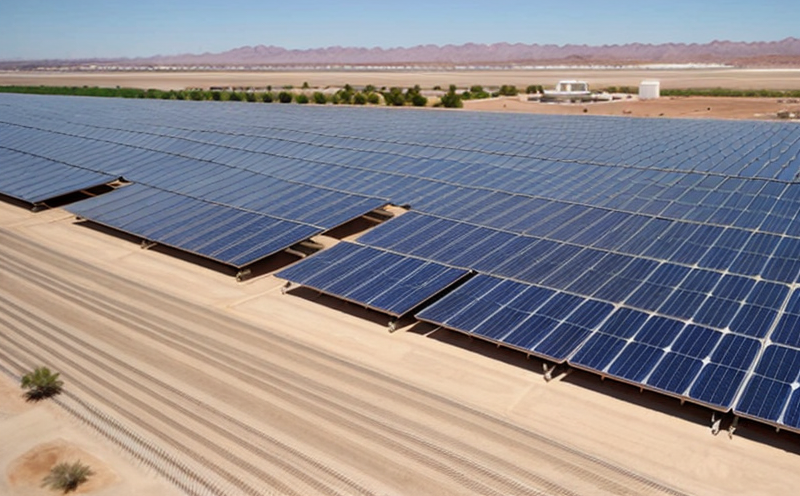ISO 22975-8 Absorber Coating Abrasion Testing
The ISO 22975 series of standards provides a comprehensive framework for the testing and certification of solar thermal systems, with ISO 22975-8 specifically addressing absorber coating abrasion tests. This service ensures that the coatings used in solar thermal collectors are resistant to wear and tear over their operational life, which is critical for maintaining efficiency and performance. The standard applies to both flat plate and concentrating solar thermal systems, where the integrity of the absorber coating directly impacts heat transfer efficiency.
The abrasion test according to ISO 22975-8 simulates real-world operating conditions that might cause wear on the absorber surface. This includes mechanical stress from fluid flow, temperature cycling, and exposure to environmental contaminants such as dust and sand. The test evaluates the ability of the coating to withstand these stresses without degrading performance.
The testing process involves subjecting the coated specimen to a predefined series of cycles, where each cycle consists of abrasion using a specified abrasive media under controlled conditions. The abrasion resistance is quantified by measuring the loss in thickness or reflectivity after exposure to these conditions. Compliance with ISO 22975-8 ensures that suppliers and manufacturers can demonstrate adherence to high-quality standards and meet the stringent requirements set for renewable energy systems.
This service is particularly important for ensuring long-term reliability, as even minor abrasion can lead to significant performance losses over time. By adhering to this standard, organizations in the energy sector can ensure their products meet international quality benchmarks, enhancing trust among consumers and regulatory bodies alike.
Benefits
The implementation of ISO 22975-8 abrasion testing offers several key advantages:
- Enhanced Durability: Ensures that absorber coatings can withstand the harsh environmental conditions typical in solar thermal applications, thereby extending product lifespan.
- Better Efficiency: By maintaining the integrity of the coating, this test helps preserve optimal heat transfer capabilities, leading to more efficient systems.
- Compliance Assurance: Provides a pathway for manufacturers and suppliers to meet international quality standards, reducing regulatory risks.
- Market Differentiation: Demonstrates commitment to high-quality materials and processes, which can be a key differentiator in competitive markets.
In summary, ISO 22975-8 abrasion testing is an essential step in ensuring the longevity and performance of solar thermal collectors. This service helps organizations maintain their reputation for delivering reliable and efficient renewable energy solutions, thereby fostering trust among stakeholders.
Industry Applications
The application of ISO 22975-8 abrasion testing spans across various sectors within the broader energy industry:
- Photovoltaic Systems: Although primarily a standard for solar thermal systems, the principles can be extended to PV applications where coating integrity is crucial.
- Concentrating Solar Power (CSP): Essential for CSP plants where high temperatures and mechanical stresses demand robust coatings.
- Solar Water Heating Systems: Ensures that collectors in residential and commercial settings maintain optimal performance over their operational lifecycle.
- R&D & Innovation: Supports ongoing research into developing new, more resilient coating materials for solar applications.
The testing process is particularly relevant to organizations focused on sustainability and green energy solutions. By adhering to this standard, they can contribute to the global effort towards reducing carbon footprints and promoting cleaner forms of energy generation.
Use Cases and Application Examples
- Manufacturer Quality Control: Ensures that each batch of coatings meets the required abrasion resistance standards before being incorporated into solar thermal systems.
- Field Testing: Provides insights into how coatings perform under real-world conditions, allowing for adjustments and improvements in manufacturing processes.
- Research & Development: Supports the development of new materials that can withstand extreme environmental pressures, enhancing overall system performance.
- Purchase Verification: Allows procurement teams to verify that the products they are acquiring meet international quality benchmarks.
In these scenarios, ISO 22975-8 abrasion testing plays a critical role in maintaining high standards of reliability and efficiency within solar thermal systems. This service is particularly beneficial for organizations involved in renewable energy projects, where performance and longevity are paramount.





